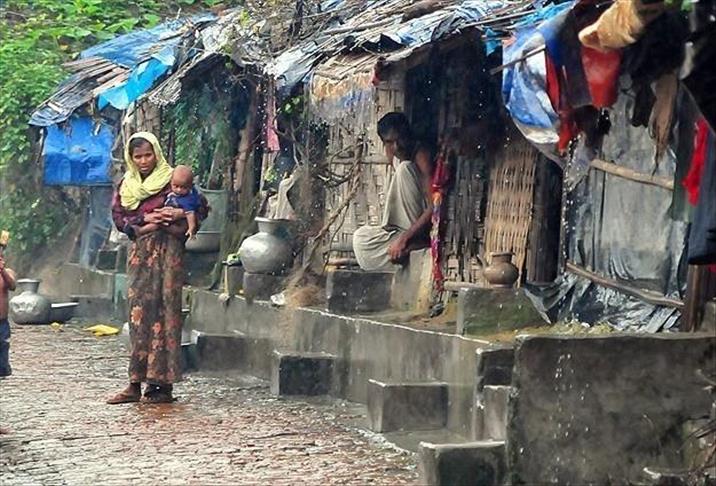
By Max Constant
BANGKOK
Three Thai officials and a Myanmar national were arrested Monday as Thailand began to reign in those suspected of involvement in the trafficking of Muslim Rohingya in its south.
The arrest was the first in a raft of measures promised by the ruling junta, following the discovery of a mass grave containing the bodies of 26 Rohingya and Bangladeshi, including three women, near a human trafficking camp in southern Songkhla on Friday.
The three local officials -- a sub-district councilor and two assistant-village chiefs -- appeared Monday at a press conference presided over by Police Chief General Somyot Punpanmuang in Songkhla, reported the Bangkok Post.
The sub-district councillor, Asan Inthathanoo, and a village assistant-chief, Ror-en Sonyalae, are accused of having provided supplies to the human trafficking camp, and the second-assistant village chief, Alee Lamoh, is accused of having been a guard at the camp.
The Myanmar national, Zaw Niang Anu, was detained in Nakhon Sri Thammarat province, north of Songkhla.
The four have been charged with human trafficking, detention and abduction for ransom. Arrest warrants have also been delivered for four other suspects.
Thailand is under immense pressure to clamp down on such smuggling after the country was downgraded to the lowest level in a U.S. State Department Trafficking in Persons report in June last year.
Deputy-government spokesman Colonel Sansern Kaewkamnerd said Sunday that Premier Prayuth Chan-ocha has stated that anyone proved to be involved in trafficking would be punished.
"If they are state officials, they will get severe penalties, both criminal and disciplinary," Kaewkamnerd said.
Army chief general Udomdej Sitabutr is now in the region to oversee the investigation into the camp, which was found hidden in the jungle close to the Malaysian border.
A well-informed NGO source has revealed to The Anadolu Agency that the discovery was made possible by the arrest last week of a major smuggler, nicknamed "Anwar of Songkhla" -- himself understood to be ethnic Rohingya.
The source did not wish to be named, as he was not unauthorized to speak to media.
He said that information given by him to the Thai police -- along with close cooperation with the Malaysian authorities -- had enabled authorities to discover the camp, which had been abandoned a few days before when the smugglers left with any surviving migrants.
Before boarding the plane Monday, police chief Punpanmuang promised "all" of those suspected of involvement "will be arrested and no one will be spared."
"This issue is causing a great problem to the nation,” he stated.
Outside of Monday's arrests, police have announced they are looking for three more suspects.
A Thai border patrol police enclosure is located not far from the human-trafficking camp, which has raised suspicions among those connected to the case of further official involvement.
A man discovered emaciated near the shallow graves Friday has told Phuketwan website that he spent nine months in a bamboo cage in the camp, which he said was controlled by eight brokers, including “Anwar.”
He said he had been told to contact his family and ask them to pay a ransom, but on not being able to reach them was detained indefinitely.
“We were the people who could not pay the ransom, so they kept us and did not really care whether we lived or died,” he said.
A former chairman of the Rohingya association of Thailand, Abdul Kamal, told the Bangkok Post on Monday that there were "at least 60 detention camps along the Thai-Malaysian border, most of them located on the Malaysian side."
"In each camp, there are between 150 and 800 people detained," he claimed.
Chris Lewa, the director of the Arakan Project, told the AA Sunday that based on information she had gathered there were now "not more than 800 persons" dispersed in three camps on the Thai side.
The Arakan Project has tracked the movement of Rohingya for over a decade.
Lewa added that increased pressure from Thai authorities had now forced the camps offshore, with many Rohingya and Bangladeshi now held off the coast of Thailand.
Most of the Rohingya who end up in the camps are from Rakhine state in Western Myanmar.
After violent clashes in the summer of 2012 with Buddhist Rakhine, they began to flee en masse in order to find safety and work in Malaysia and beyond.
At first, they boarded rickety boats controlled by human smugglers -- which sometimes sank during the trip across the Andaman Sea -- but since last year they have been travelling on larger vessels.
Bangladeshis are also increasingly using human smugglers to go to what they see as the economic promise of Malaysia. But some of them -- along with the Rohingya -- are kidnapped and forced to board the boats.
Once arriving near the Thai coast, they are taken by truck to camps hidden in the jungle and detained until their families pay ransom.
They are then left to attempt to cross the border into Malaysia.
Anadolu Agency website contains only a portion of the news stories offered to subscribers in the AA News Broadcasting System (HAS), and in summarized form. Please contact us for subscription options.


